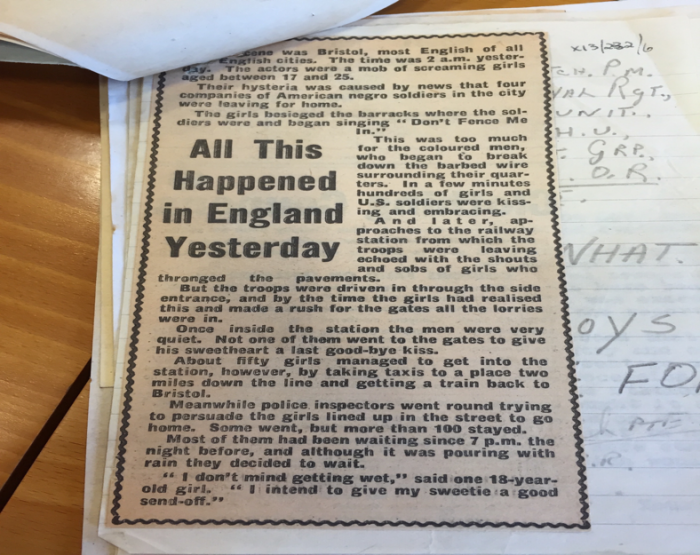University of Bristol history graduate Karen Mead reflects on her summer research internship and how it led her to a dissertation on Bristol women’s relationships with American GIs:
When I was invited to be a history research intern last summer, I was thrilled. I could never have anticipated the journey on which the research would take me! The project initially involved researching African-American GIs’ experiences in Bristol during the Second World War. Together with Dr Julio Decker, lecturer in North American history, I was to work with archival material from the Bristol Archives. As with many archives, much of the Bristol Record Catalogue is conveniently listed online. Following an extensive search of the material they held, it seemed they held promising material for the research project. I made an appointment and was excited to be viewing primary sources, the bedrock of historians’ work.
It quickly became clear, from looking at the initial material, that the task was not going to be as straightforward as I had imagined. From the outset, despite online listings to the contrary, police records for the crucial war years were missing. Equally, some of the material had sustained damage and some records were incomplete. It also became clear that, due to the US military having jurisdiction over their own servicemen, any records of their transgressions were likely to be held in the United States; this further limited the material we could work with. Unfortunately, these problems are regular obstacles that historians can encounter in the course of their research. Nevertheless, inspiration came from an unlikely source. Following nearly nine months of research, the unexpected find of twelve letters to the Bristol Mayor, which initially seemed outside the scope of the research project, transformed the central focus of the research project onto a under examined area of the Second World War.
Whilst examining the Lord Mayor’s Wartime Correspondence, I came across a selection of letters written by members of the public, British servicemen, and even from America following the publication of a small article in the Sunday Pictorial Newspaper in August 1945. The article detailed scenes in Bristol when African-American soldiers were leaving to return to the United States at the end of the war. Whilst the authenticity of the article may be apocryphal, the responses were damning. The writers of these letters fiercely criticised the purported behaviour of these women. This indicated to me that these writers perceived the behaviour as unpatriotic and suggests that some British servicemen considered British women their property on their return from the war.

Reproduced with the kind permission of Bristol Archives: LM/C/X13/232. http://archives.bristol.gov.uk/Record.aspx?src=CalmView.Catalog&id=LM%2fC%2fX13%2f232&pos=1
With such clear condemnation and an awareness of the contemporary labels attached to women who had relationships with American servicemen, these letters led me to consider the motivations and experiences of these women. At first, I thought that this topic would have attracted significant historical scholarship. To my surprise, only a few female scholars had directly looked at these relationships in the last few years. Their research focussed on government actions to discourage such relationships, the tension they caused, and the framing of the relationships as unpatriotic.[1] These articles were notable for their lack of evidence from the women themselves. In light of the sparse scholarship, I wanted to recover these women’s stories. As many of these women did not leave contemporary accounts for historians to draw upon, this proved challenging.
After much searching, I found oral history interviews and questionnaires completed by GI brides in the Imperial War Museum Archives in London. These detailed oral history interviews and questionnaire responses, covering their experiences of meeting their husbands to moving to America, shed light on a previously unexplored aspect of the social history of the Second World War. Importantly, these sources challenged the limited historical research on these relationships to date and formed the bedrock of my dissertation. My final piece ‘Finding Love in War: An examination of the motivations and experiences in their relationships with American GIs during the Second World War, 1942-1946’ combines oral history and documentary sources. It reveals that – contrary to contemporary stereotypes – the women in the study married their American GIs for love, had positive experiences introducing their GI to their families and were welcomed by their new American relatives. This study challenges prevailing historical scholarship on these relationships, which has suggested women were motivated by the luxury items that GIs could provide, often resulting in transitory encounters. Moreover, it highlights the importance of diversifying the historical picture by examining evidence from the individuals involved.
[1] L.McCormick, One Yank and They’re Off: Interaction between US Troops and Northern Irish Women 1942-1945, Journal of the History of Sexuality, 15 (2006), 228-257; S. O’ Rose, ‘Girls and GI’s: Race, Sex, and Diplomacy in Second World War Britain’, The International History Review, 19 (1997) 146-160; W. Webster, ‘Fit to Fight, Fit to Mix’: Sexual Patriotism in Second World War Britain, Women’s History Review, 22 (2013), 607-624.
